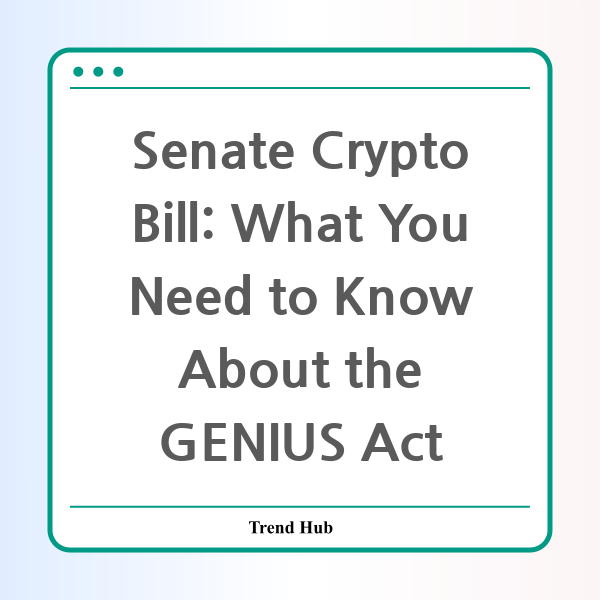* This website participates in the Amazon Affiliate Program and earns from qualifying purchases.

Is the Senate Crypto Bill the Future of Digital Currency?
Recent events in Washington have spotlighted the ongoing evolution of cryptocurrency regulation, particularly with the advancement of the GENIUS Act—a significant piece of legislation seen as the first of its kind aimed at regulating stablecoins. This bipartisan bill garnered attention as it moved towards a procedural vote, showcasing a blend of political maneuvering and concerns over financial privacy and national security.
The Genesis of the GENIUS Act
The GENIUS Act, which stands for "Governance and Equity in New Industry for Universal Standards," was brought to the Senate floor after a week of intense negotiations. The bill aims to set a regulatory framework for stablecoins—digital tokens pegged to traditional currencies like the U.S. dollar. With a vote of 66-32, it has sparked a wave of debates regarding the implications of such regulations not just on the crypto market, but also on individual freedoms and financial practices within the U.S.
While the act has passed through the Senate with significant bipartisan support, it nearly floundered just weeks prior due to the lack of Democratic backing, largely stemming from concerns over consumer protection and the potential for monopolistic practices by tech giants. In particular, the introduction of amendments aimed at increasing consumer safeguards and curtailing tech giants from issuing their own stablecoins appeared to tilt the balance in favor of advancing the bill.
Key Features of the GENIUS Act
- Establishes a framework for the issuance of stablecoins.
- Includes provisions to ensure consumer protections.
- Prohibits members of Congress and senior officials from issuing payment stablecoin products while in office.
- Addresses the concerns over tech companies’ interests in cryptocurrency markets.
Political Ramifications and Concerns
The political implications of the GENIUS Act are vast. On one hand, proponents argue that passing this bill will facilitate faster and more accessible payments, essentially modernizing financial transactions in an increasingly digital economy. As Kara Calvert from Coinbase noted, this legislation would be a transformative step for Americans seeking efficient payment systems.
Conversely, critics raise alarms about its potential to empower Big Tech companies that could dominate the financial sphere with their proprietary stablecoins. The fear is that by allowing these corporations to engage in banking-like services, the firewall traditionally separating banking from commerce, established by the Glass-Steagall Act nearly a century ago, could be dismantled. They argue this could lead to a monopolistic landscape where companies like Amazon or Meta could control the currencies consumers use, creating a major shift in power dynamics.
The Future of the GENIUS Act
If the Senate successfully passes the GENIUS Act, its future in the House remains murky, as there are competing bills vying for regulatory control over stablecoin issuers. The situation is further complicated by ongoing discussions around broader cryptocurrency regulation that may impact how digital assets are treated legally and financially.
As this journey unfolds, it's evident that the debate over the GENIUS Act extends beyond mere legislation; it encapsulates larger concerns about privacy, security, and the role of technology in shaping our financial future. As stakeholders on both sides of the argument ramp up their advocacy, the next steps regarding this bill could ultimately define the landscape of cryptocurrency regulation for years to come.
In conclusion, the Senate's advancement of the GENIUS Act marks an important chapter in the interplay between regulation and innovation in the cryptocurrency space. Whether it leads to a flourishing digital currency environment or gives way to potential monopolistic practices remains to be seen.
* This website participates in the Amazon Affiliate Program and earns from qualifying purchases.